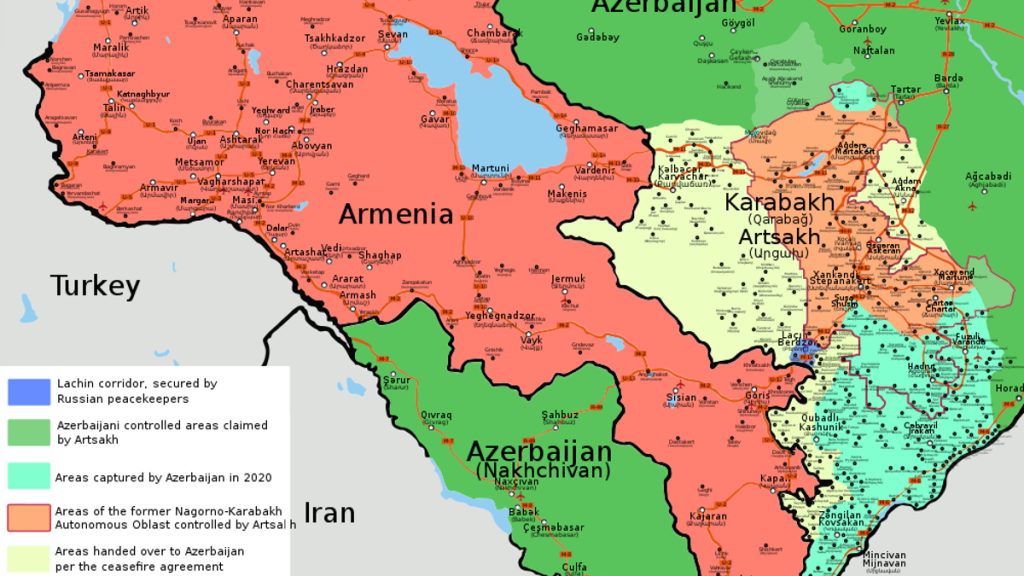Two years after Armenia lost the war against its archenemy Azerbaijan over Nagorno-Karabakh, Yerevan seems to be looking for a model that would allow it to de facto capitulate to Baku, but at the same time to save face. Azerbaijan, strongly backed by its ally Turkey, will undoubtedly continue pressuring the land-locked nation to fulfill the ceasefire deal signed in Moscow in November 2020 – a document that many in Yerevan see as capitulation.
As a result of the 44-day war, Armenian forces lost control over parts of Nagorno-Karabakh and seven adjacent districts, including strategically important town of Lachin. It is worth remembering that in 2016 Azerbaijan’s President Ilahm Aliyev offered $5 billion to the then Armenian President Serzh Sargsyan for the seven regions around Nagorno-Karabakh. The Armenian leader countered that he was ready to offer $6 billion to Aliyev to give up Azerbaijan’s claims to the districts in question. Two years later Sargsyan was forced to resign after mass protests in Yerevan led to the so-called Armenian Velvet Revolution.
Sargsyan had faced criticism in Armenia over his close ties to the Russian President Vladimir Putin. On the other hand, Armenia’s new leader, Prime Minister Nikola Pashinyan, is seen by some structures in Russia as a person who has very close ties with Jewish billionaire George Soros. Still, it remains unclear why the Kremlin – Armenia’s nominal ally in the Collective Security Treaty Organization (CSTO) and the Eurasian Economic Union (EAEU) – did not prevent “Soros’s man” from coming to power in Yerevan in 2018.
Although Pashinyan lost the 2020 war, he won reelection in 2021. The Armenian Prime Minister is, nevertheless, seen by the opposition as a “traitor”. Still, quite aware that Armenia cannot count on Russia’s support, nor that Russian peacekeeping troops – deployed to Nagorno-Karabakh in 2020 as a result of the ceasefire deal – will prevent Azerbaijan from capturing more territory in the region, Pashinyan has decided to resettle the Armenian population of the city of Lachin and towns located in the Lachin corridor. Authorities of the Armenia-backed self-proclaimed Republic of Artsakh have reportedly promised to give residents money to buy new homes elsewhere.
According to the peace deal, the five-kilometer-wide (three miles) Lachin corridor, including the town of Lachin, would remain under Russian peacekeeping control until the construction of a new route connecting Armenia with Nagorno-Karabakh is outlined in three years. Azerbaijan has, however, already completed the construction of a new road that will replace the Lachin corridor, and its troops have entered the town of Lachin on August 26.
The Lachin corridor is presently the sole route connecting Armenia and Artsakh (Armenian name for Nagorno-Karabakh). Now that Azerbaijan has a full control over Lachin, Armenia is expected to build an alternative route that will preserve its connection with Karabakh. However, given that Baku, as the clear winner of the 44-day war, has a significant leverage over Yerevan, Azerbaijan will undoubtedly continue pressuring Armenia to withdraw all of its remaining troops from Nagorno-Karabakh – internationally recognized as part of Azerbaijan, although it has been under the ethnic Armenian control for almost three decades. Moreover, Baku will pressure Yerevan to complete the process of border demarcation between the two countries, which could result in addition territorial losses for Armenia. Finally, Azerbaijan will insists that Armenia must construct its section of the Nakhchivan corridor, also known as the Zangezur corridor, and allow the energy-rich Caucasus nation to have a flawless connection to its exclave of Nakhchivan, passing through the Armenian territory.
Armenia, defeated and abandoned by its nominal ally Russia, seems to be attempting to distance itself from the Kremlin, and build strong ties with Western countries in an attempt to improve its positions in the region. Recent Pashinyan’s recent criticism against Russian peacekeepers in Nagorno-Karabakh, and stoking anti-Russian sentiments in Armenia, could be interpreted as part of Yerevan’s attempt to cool of its relations with Moscow.
“Independence is strong allied relations for us, but allies are not always allies of you, but of those who ally against you”, Pashinyan said on August 23.
Indeed, despite being the Armenian ally, Russia was in the past selling weapons to its archenemy. More importunately, in May 2021, after Azerbaijani troops reportedly seized certain parts of the Armenian territory, Pashinyan has asked CSTO for help. The Russian-dominated block, however, never protected its member. The Kremlin, preoccupied with its so-called special military operation in Ukraine, now risks losing much of its influence in the Caucasus.
For the foreseeable future, Armenia will almost certainly remain in a nominal alliance with Russia, although it will continue developing close ties not only with Western countries such as the United States and France, but also with Iran, given that the Islamic Republic is worried about growing Turkish influence in the region. Therefore, in case Baku attempts to seize southern parts of Armenia – which is not very realistic at this point – and create a corridor that would link mainland Azerbaijan with Nakhchivan, and further with Turkey, it is Tehran, rather than Moscow, that will openly back Armenia.
